The Critics Choice Association held its 5th annual Celebration of Latino Cinema & Television in L.A. on Friday, coming at a particularly fraught time for a community that is being specifically targeted by the Trump administration.
That…

The Critics Choice Association held its 5th annual Celebration of Latino Cinema & Television in L.A. on Friday, coming at a particularly fraught time for a community that is being specifically targeted by the Trump administration.
That…

A new AI system can predict disease risks up to 10 to 20 years before symptoms even occur.
As Innovation Origins reported, researchers developed Delphi-2M using over 40,000 Biobank participants and 1.9 million Danish medical records. It can…
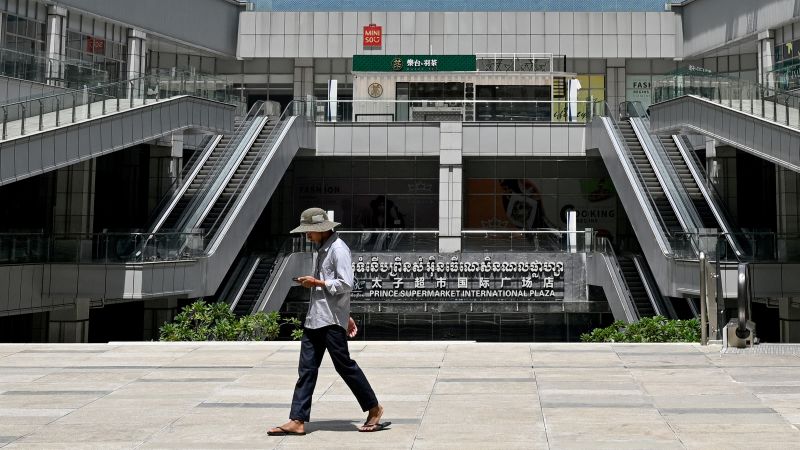
Hong Kong
—
He is a baby-faced tycoon who rose to the highest echelons of power in his adopted home of Cambodia, where he bestows scholarships and runs philanthropy programs while overseeing one of the country’s largest and best-connected conglomerates.
But behind this façade, Chen Zhi, 37, runs one of the largest transnational criminal organizations in Asia, US authorities say, an empire fueled by forced labor and cryptocurrency scams that at one point were allegedly earning Chen and his associates $30 million every day.
The money went on buying Picasso artwork, private jets and properties in upscale neighborhoods of London, as well as supplying bribes to public officials, according to prosecutors in New York, who last week announced they had seized $15 billion in cryptocurrency from Chen following a years-long investigation.
That action has thrown a rare light on an alleged kingpin of Southeast Asia’s murky and criminal world of online scams, which US authorities say operate under the protection of powerful politicians, and conned victims in the US alone out of at least $10 billion dollars last year.
Chen’s Prince Group employs thousands of people and bills itself as one of the biggest conglomerates in Cambodia, with investments in luxury real estate, banking services, hotels, major construction developments, grocery stores and even luxury watches.
But last week, the company was declared a transnational criminal organization by United States authorities, and Chen was charged in absentia in New York with money laundering conspiracy and wire fraud conspiracy, along with several associates.
He is still at large, and currently faces no legal threat in Cambodia, which has no extradition treaty with the US.
Prince Group, American and British authorities allege, was the umbrella for more than 100 shell companies and entities allegedly used to funnel laundered cash across 12 countries and territories from Singapore to St Kitts and Nevis.
“Chen Zhi isn’t a mob boss as we traditionally conceive of them – he is (or rather was) the polished face of a state-protected criminal economy,” said Jacob Sims, visiting fellow at Harvard University’s Asia Center and a transnational crime expert.
CNN has reached out to Prince Group for comment. CNN has also reached out to the Cambodian government and interior ministry for comment.
Prince Group has previously denied allegations of wrongdoing as “false and defamatory” in statements published on its website. Those statements have since been taken down.
Little was known about Chen, also known as Vincent, until he arrived in Cambodia and began splashing enormous amounts of cash.
He was born in China’s southeastern province of Fujian on December 16, 1987, according to the US Treasury Department.
His first business ventures were reportedly an internet café and gaming centers in the provincial capital Fuzhou. In 2011, he plunged into the “uncharted waters of real estate investment in Cambodia,” according to a profile on the website of DW Capital Holdings, a Singapore-based fund manager that lists Chen as its founder and chairman, and which is among the companies sanctioned by the US.
In those “uncharted waters,” a rush of mainly Chinese developers started building casinos in the western Cambodian city of Sihanoukville in the 2010s, turning the quiet seaside town and backpacker haven into a roaring gambling mecca, encouraged by lax regulation and the easy availability of casino licenses.
With the casinos and online gambling came organized crime, money laundering, prostitution, drug trafficking and online scamming. The town was described as a “wild west” where a prolific business-crime nexus emerged.
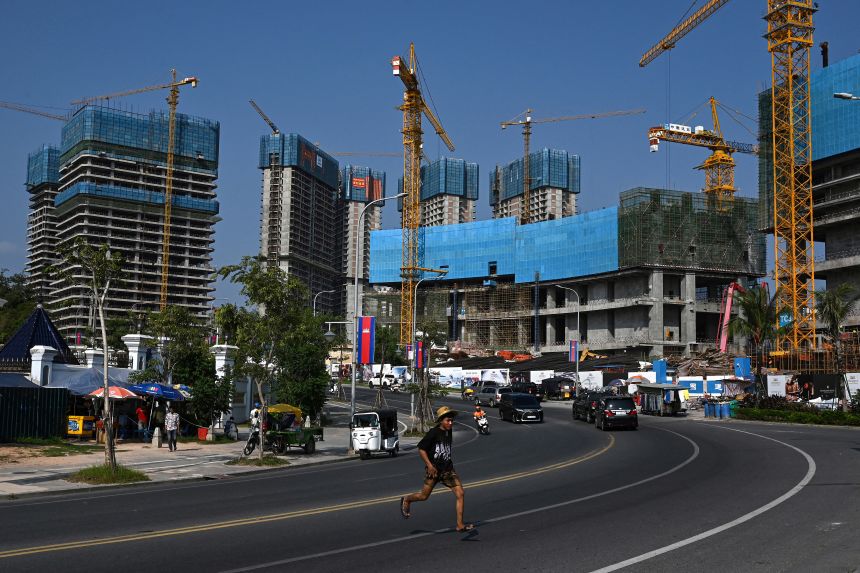
Shortly after his arrival in Cambodia, Chen became a naturalized Cambodian citizen – an option available to applicants who donate $250,000 to the state. Analysts say he acquired venerable titles and rapidly gained influence with the Cambodian elite.
He was elevated to be a senior adviser to the government at the rank of minister, was personal adviser to former Prime Minister Hun Sen, and then his son and successor Hun Manet, and bestowed with the honorific “neak oknha,” a title awarded to prominent businesspeople.
Video posted by the former Cambodian leader shows Chen standing alongside Hun Sen in 2022 during a meeting of investors. Chen was also part of a delegation that traveled with Hun Sen to Cuba in 2022, during which he met Cuban President Miguel Díaz-Canel and was listed as an “adviser” to Hun Sen.
According to the US indictment, Chen also traveled to the US in April 2023 using a diplomatic passport – a document it alleges Chen obtained after purchasing luxury watches for a senior foreign government official.
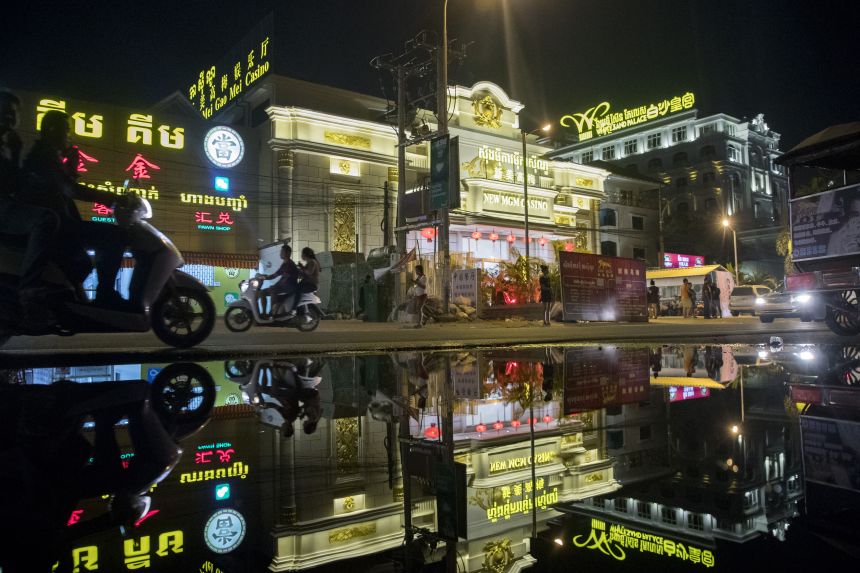
Browse the website of Chen’s Prince Group, and the company’s public image is one of charitable endeavors, business accolades and awards for corporate social responsibility initiatives, large donations to anti-Covid efforts, and education programs.
The group’s charitable trust claims to have donated funds worth $14 million to help Cambodians in a range of initiatives. The company even opened a Prince Horology Vocational Training Center, billed as the country’s first independent watch school.
And it commands a visible presence in the country, with skyscrapers dotting the skylines of Cambodia’s cities. Through its subsidiary Canopy Sands Development, Prince Group has embarked on a $16 billion project near Sihanoukville to develop a 934-hectare “eco city” called the Bay of Lights.
But federal prosectors allege that empire extended to at least 10 forced labor camps in Cambodia, where workers were coerced into carrying out scams “at high volumes” under the threat of violence. The indictment described vast dormitories surrounded by high walls and barbed wire where incidences of violence and coercion were “frequent.”
From alleged organized crime investments in Palau to shell companies in the British Virgin Islands, Hong Kong and Singapore, investigators implicated 146 entities and individuals linked to Chen, his Prince Group and associates.
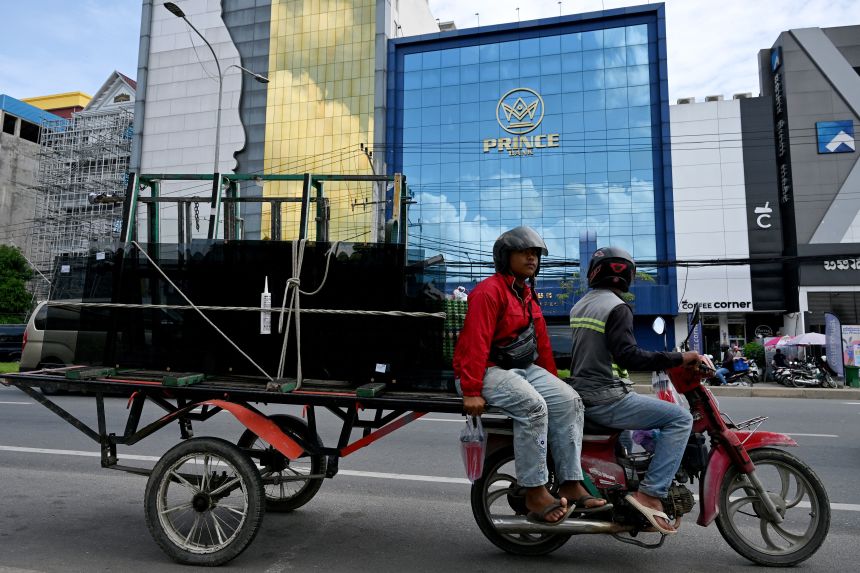
“It’s really remarkable in terms of both the state, the scale and size of what they’ve seized, but also the extent to which they’ve been able to identify and target so many of the different nodes of this particular criminal network,” said Jason Tower, a senior expert at the Global Initiative Against Transnational Organized Crime (GI-TOC).
As well as Cambodian citizenship, Chen is listed by the US Treasury Department as having passports from Cyprus and the small Pacific island of Vanuatu.
Several of the addresses listed to Chen are in Hong Kong. Construction and engineering services firm Geotech Holdings – which has seven subsidiaries, each sanctioned by the US government – has headquarters in Kwai Chung, home to the city’s container port. The company did not respond to CNN’s request for comment.
Authorities also allege Chen and his co-conspirators bribed public officials in China and elsewhere to stay ahead of investigations and raids on the forced labor compound. Chen kept ledgers of bribes, according to the indictment, and in 2019 a $3 million yacht was bought for a senior official in an unnamed foreign government.
By approximately 2020, Chen had allegedly amassed a staggering sum of laundered proceeds that included approximately 127,271 bitcoin worth $15 billion across unhosted cryptocurrency wallets whose private keys he personally held.
Chen mastered a combination of elite access, patronage and philanthropy “that opened doors across real estate, finance, and politics, ultimately providing him the resources and protection needed to grow his scam empire,” said Sims.
Cambodia has been described by analysts as a de facto scam state that risks becoming a global pariah if it fails to act against the criminal networks within its borders.
The global scam industry, estimated to be worth between $50 billion and $70 billion, is evolving at an unprecedented scale, the United Nations Office of Drugs and Crime said earlier this year, despite widely publicized crackdowns on scam compounds in Myanmar.
Cambodia, which has emerged as an epicenter of this scam economy, is estimated to make $12.5 billion to $19 billion a year from cybercrime – equivalent to about 60% of the country’s GDP, according to a report published by the Humanity Research Consultancy in May.
In June, an Amnesty International report accused the Cambodian government of “deliberately ignoring a litany of human rights abuses including slavery, human trafficking, child labour and torture” carried out by criminal gangs in scamming compounds across the country.
And the US State Department named Cambodia a state sponsor of human trafficking in its 2025 Trafficking in Persons report, which noted that senior Cambodian officials owned properties used by online scam operators to exploit victims.

Analysts estimate there are about 300 scamming compounds in the country with a workforce of up to 200,000 people. Cambodia’s garment and textile industry, long a mainstay of its economy, employs about 1 million people, according to the UN.
The Humanity Research Consultancy report, authored by Sims, goes further, detailing how the Cambodian leadership and Cambodian state institutions are “deeply and directly implicated in the growth, durability, and flourishing” of the country’s scam industry.
“The charges focus on Chen and Prince, not the state per se, but the pattern is unmistakable: you don’t build ten forced-labor scam compounds, move billions, and buy impunity without political protection,” Sims said. “It is impossible to imagine that such vast wealth would be moving through the system without the explicit knowledge and participation of its strongman and his immediate circle.”
The criminal operations have gone largely unchallenged in Cambodia due to the complete dismantling in recent years of the country’s civil society and independent media.
In October 2024, the arrest of prominent Cambodian journalist Mech Dara, who helped expose the human trafficking fueling online scam centers, prompted widespread international concern.
“Civil society in Cambodia has been decimated,” said GI-TOC’s Tower. “And anyone who goes and reports on this issue now they’re silenced. So there’s no space to report on the scam economy, or to raise these issues in the media, civil society can’t touch it.”
The Cambodian government has repeatedly denied any link to the cybercrime industry, and said this month that it is “committed to preventing and suppressing all forms of cross-border crimes, particularly online scams.”
Earlier this year, Prime Minister Hun Manet established a commission to target the scammers. The government says it has led to the arrest of 3,455 suspects, of 20 nationalities, accused of cybercrime. Authorities also say they have broken up several organized crime and trafficking networks, rescuing human trafficking victims in the process.
“We do not protect individuals who violate the law,” Cambodia’s Interior Ministry spokesman Touch Sokhak told the Associated Press news agency regarding Chen. He stressed that Cambodia’s government itself does not accuse Prince Group or Chen of wrongdoing.
The ministry has also rejected reports that Interior Minister Sar Sokha is a co-investor in the Jin Bei Casino Company – which the US Treasury said runs “among the most notorious” of Prince Group’s scam compounds. Meanwhile, the National Bank of Cambodia said it was “taking careful monitoring and investigation measures” to ensure Prince Group’s financial services arm Prince Bank “complies with Cambodian laws.”
Cambodia is “at a crossroads,” said Tower.
The UK-US action “sends a very strong signal to both the criminal networks, as well as to those elites in Cambodia that are protecting them, and sponsoring them… that this type of impunity is not going to continue, that your assets are no longer safe. And so, I think it is potentially a game changer,” Tower said.
Regional countries have begun to act against the crime flourishing inside Cambodia’s borders that has ensnared their citizens.
South Korea last week issued a travel ban for parts of Cambodia after the death of a South Korean student lured to work in the scam compounds, according to police. More than 60 South Korean nationals were deported from Cambodia and police are seeking to detain most of them over allegations they were involved in online scams.
Chen is at large, with a net worth somewhere in the tens of billions, analysts believe. And the scam compounds in Cambodia continue to operate, stealing money from victims including US citizens.
“It’s not like there’s an off button that you can push to stop all of these scam centers,” said Tower.
The question now turns to whether the US, UK and their allies can use the leverage from their joint operation effectively to dismantle the highly lucrative industry.
“This is the first time Washington and London have hit the architecture – the elite ownership, the laundering conduits, and the money itself – at the very top,” Sims said.
“Blunting (Cambodia’s) ability to operate as a de facto scam state will not only materially disrupt the crime today, it will also serve as an effective deterrent model as this crime continues to spread globally,” he added.
“Now is the time to keep the pedal down.”

Scientists have developed a new method that can help them probe inside atom’s nucleus. Developed by researchers at MIT, the method uses the atom’s own electrons as “messengers” within a molecule to help probe inside the nucleus.
“Our…

Symrise (XTRA:SY1) shares have seen some movement recently, prompting fresh discussion among investors about its shifting valuation. With the past month showing a 10% gain, many are revisiting the stock’s potential as market conditions evolve.
See our latest analysis for Symrise.
Symrise has bounced back with a 1-month share price return of nearly 10%, reversing some of the losses seen earlier this year. Even so, the 1-year total shareholder return is still down over 27%. This suggests that while recent momentum is encouraging, many investors remain cautiously optimistic given the long-term underperformance.
If you want to broaden your search beyond Symrise, this could be the perfect time to discover fast growing stocks with high insider ownership
With analyst targets still well above the current share price, and growth estimates in the mix, the key question now is whether Symrise remains undervalued or if the recent recovery means the market already anticipates future gains.
With Symrise’s narrative fair value set at €103.53, shares closed at €81.82, highlighting a clear divergence between current sentiment and future expectations according to the prevailing view.
Symrise is executing a multi-year transformation focused on operational efficiency, portfolio optimization, and disciplined cost management, which is already yielding substantial margin improvements (notably, a gross margin increase of 250 bps and an EBITDA margin uplift). This is laying the groundwork for structurally higher net margins and improved earnings compounding.
Read the complete narrative.
Curious what’s fueling this bullish target? The secret mix includes aggressive margin upgrades, bold strategic initiatives, and forecasts that could reset investor expectations. See which financial levers might be game-changers, and what numbers experts are betting on to propel Symrise far above its current price.
Result: Fair Value of €103.53 (UNDERVALUED)
Have a read of the narrative in full and understand what’s behind the forecasts.
However, slower growth in key end markets or underwhelming margin improvements could challenge the upbeat outlook and limit Symrise’s share price recovery.
Find out about the key risks to this Symrise narrative.
While Symrise looks undervalued on a fair value basis, its price-to-earnings ratio of 22.6x is higher than both European Chemicals peers (17.2x) and the peer average (20.4x). This is also above the fair ratio of 19.6x. This suggests a risk that the market may eventually pull the share price closer to these lower multiples. Does this signal an opportunity or a warning?

Phillips Edison (PECO) reported net profit margins of 11.5%, up from last year’s 9%, highlighting a notable improvement in profitability. Earnings grew 41.1% year over year, outpacing the company’s five-year average growth of 36.9% per year. However, future earnings and revenue are forecast to rise at slower rates of 3.95% and 5% per year respectively. As share price remains high relative to industry peers, investors now face the trade-off between strong historical growth and a steep valuation multiple.
See our full analysis for Phillips Edison.
Next, we will see how these headline results stand up when compared to the key narratives shaping sentiment around Phillips Edison. Some expectations may hold up, while others could be challenged.
See what the community is saying about Phillips Edison
Renewal leases at Phillips Edison are generating spreads of over 20%, while new leases are delivering more than 30% spreads. Both factors support recurring income and gradual net margin expansion.
According to the analysts’ consensus view, these strong leasing spreads back up the idea that demographic tailwinds in suburban markets and high occupancy rates, currently at a record 97.4%, are helping to reinforce stable, long-term revenue and NOI growth.
Portfolio trade areas average a $92,000 median income, which is 15% above the US average and supports the narrative of rising foot traffic and tenant sales based on concrete demographic strength.
Omnichannel trends and necessity-based tenant demand, as highlighted in the consensus narrative, support higher rent escalations and retention rates. This benefits both current returns and the margin outlook over time.
What’s driving analysts’ conviction? Bulls and bears both see unusually sticky demand, but only time will tell if those 97.4% occupancy rates can stay this high.
📊 Read the full Phillips Edison Consensus Narrative.
With 95% of its debt fixed-rate and a weighted average maturity of 5.7 years, Phillips Edison’s balance sheet is designed to handle rising rates. This lets management focus on strategic acquisitions rather than dilutive equity raises.
Analysts’ consensus narrative highlights how a disciplined approach to new property deals, often below replacement cost and at a 6%+ cap rate, positions Phillips Edison to steadily grow earnings and FFO, even in a competitive real estate environment.
Low leverage of 5.4x EBITDAre allows PECO to opportunistically pursue high-growth, grocery-anchored properties, supporting external growth without overextending the balance sheet.
This active “portfolio recycling” and acquisition strategy is seen by consensus as a core ingredient for long-term FFO and EPS expansion, especially while institutional investor demand for stable, necessity-based retail remains high.

Avis Budget Group (CAR) has introduced Avis First, a premium concierge-style car rental service now available at select European airports. The announcement highlights an effort to elevate customer experience and reposition the brand within the competitive premium travel segment.
See our latest analysis for Avis Budget Group.
Avis Budget Group’s rollout of Avis First comes at a dynamic time for the stock. After a volatile nine months, the share price has rebounded sharply with a year-to-date return of 95.2% and a one-year total shareholder return of 90.6%. Momentum is clearly building again, even as the company navigates broader market shifts and pushes for growth through premium services like this.
If premium offerings like Avis First have you curious about what else is trending in the travel and mobility sector, it could be the perfect opportunity to explore See the full list for free.
With shares trading above some analyst targets, the big question emerges: is Avis Budget Group’s recent rally justified by fundamentals, or are we simply seeing future growth already priced in? Is there still value to be found for buyers, or have markets already factored in all the upside?
With last close at $157.01 and the most widely followed narrative setting fair value at $148, sentiment is heated. The stock’s current price bakes in optimistic growth. Are bold business shifts justified, or is the narrative ahead of reality?
The launch and rapid scaling of Avis First, a premium rental offering, could be fueling expectations of significant revenue and margin expansion, as investors anticipate a sustained uplift in average revenue per day (RPD) and market share capture from price-insensitive travelers; this optimism may not fully account for competitive responses or changing customer preferences, increasing the risk that future revenue and net margin improvements fall short of current valuations.
Read the complete narrative.
What are the hidden drivers behind such a premium price tag? The projections fueling this narrative rely on future profitability metrics that are not typical for this sector. Want to find out if aggressive revenue growth, margin leaps, or declining share counts drive this narrative’s math? The dramatic inflection points behind the fair value are more surprising than you might expect. See for yourself how the pieces fit together.
Result: Fair Value of $148 (OVERVALUED)
Have a read of the narrative in full and understand what’s behind the forecasts.
However, if premium demand falters or competition intensifies, the company’s anticipated revenue growth and improving margins could quickly come under pressure.

ChoiceOne Financial Services (COFS) has posted average annual earnings growth of 0.9% over the past five years, but the latest results reflect net profit margins dropping to 13% from 27.2% a year ago. The company also recorded a significant one-off loss of $17.7 million in the last 12 months, weighing on reported numbers. Despite the margin pressure and recent loss, analysts project robust earnings growth of 28.9% per year, which is well above the expected pace for the broader US market. However, revenue growth is forecast to trail overall industry trends.
See our full analysis for ChoiceOne Financial Services.
Next, we will see how the numbers compare to the most widely held narratives in the market and where investors might want to challenge their assumptions.
Curious how numbers become stories that shape markets? Explore Community Narratives
The $17.7 million one-off loss in the past year directly reduced net profit margins to 13%, a significant drop compared to the prior year’s 27.2%. This occurred even as revenue is projected to rise moderately at 6% per year.
Bulls would normally argue that strong earnings growth projections support resilience even after setbacks. However, projected 28.9% earnings growth now coexists with worsened profitability metrics linked to the recent large loss.
Robust forward earnings expectations surpass the overall US market. At the same time, the impact of such a major non-recurring loss invites questions about the underlying quality of these projected gains.
While optimism surrounds future growth, the margin reversal and sizable loss may test bullish confidence if similar surprises continue.
At a price-to-earnings ratio of 32.5x, COFS trades at a much higher level than both the peer average of 9.7x and the US Banks industry average of 11.2x. This indicates the stock is valued at a notable premium versus comparables.
Critics highlight that, while discounted cash flow valuation suggests a substantial 54% gap between the current $30.59 share price and the DCF fair value of $66.35, the sharp premium on the P/E ratio compared with industry standards creates tension for anyone concerned about overpaying for future growth.
The current P/E multiple implies very high expectations are already priced in, even with forecasted earnings expansion.
This valuation disconnect prompts cautious investors to question whether predicted growth justifies paying so far above both company peers and the sector as a whole.
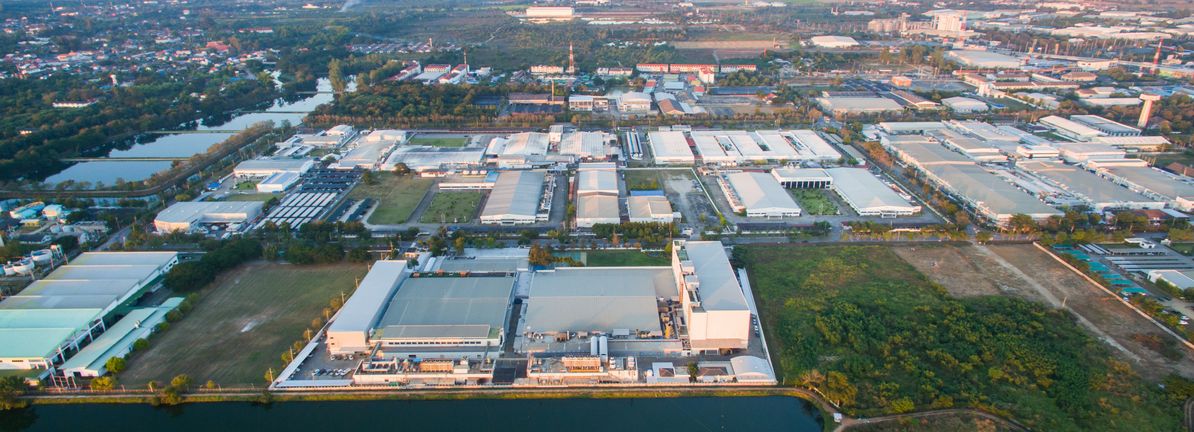
EastGroup Properties (EGP) posted earnings growth of 6.8% in the last year, coming in below its 14.3% per year average over the past five years. Net profit margins slipped to 35.7% from 37% in the previous year, while the shares are trading at $177.2, well below an estimated fair value of $230.46 by discounted cash flow. With earnings growth projected at 10.3% annually and revenue expected to rise 9.7% per year, investors will note the company’s continued profitability and attractive dividend, but may also weigh its premium valuation against peers and recent moderation in profit growth.
See our full analysis for EastGroup Properties.
The next section puts these results head-to-head with the most widely followed narratives for EastGroup Properties, highlighting where the numbers confirm or challenge investor sentiment.
See what the community is saying about EastGroup Properties
Net profit margin slipped to 35.7%, down from 37% last year, but analysts project an increase to 36.9% over the next three years as revenue and earnings scale up.
Analysts’ consensus view highlights that persistent demand for logistics space in Sunbelt markets, coupled with limited new supply, underpins continued pricing power and potential for further margin recovery.
Margin expansion is expected to benefit from structural migration to high-growth states. This supports net operating income stability even as certain regional assets face headwinds.
Consensus narrative notes that the company’s focus on infill, last-mile logistics keeps occupancy high and reinforces robust rental growth that earns back some margin lost in recent periods.
To see how both margin resilience and local headwinds shape analyst views, see where the consensus stands for EastGroup Properties. 📊 Read the full EastGroup Properties Consensus Narrative.
EastGroup trades at a price-to-earnings ratio of 38x, notably higher than the sector average of 16.7x and the peer average of 29.2x, despite recent moderation in earnings growth.
Analysts’ consensus view contends that while pricing could appear stretched, the company’s robust balance sheet and land bank provide the opportunity to pursue new developments if capital access improves.
Consensus expects future PE to rise further, reaching 45.3x on projected 2028 figures. This remains well above the US Industrial REITs industry and validates a premium only if multi-year growth is maintained.
Still, valuation upside rests on EastGroup sustaining high occupancy and rental spreads amid forecasts for share count dilution and evolving capital markets.